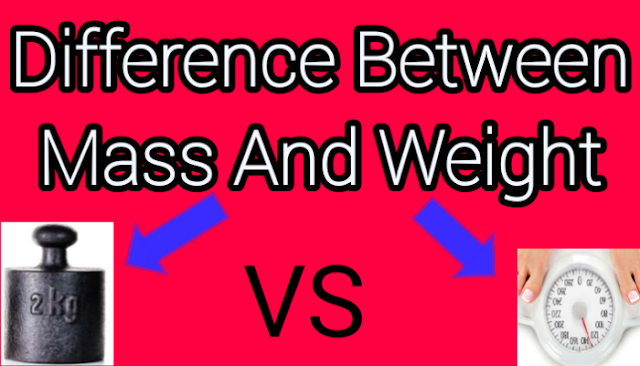What is the difference between mass and weight?
Weight and mass are considered to be the same quantities. But many people tend to misuse these terms in their daily conversations.
The main difference between weight and mass is that weight is the force of gravity by which the earth attracts towards it whereas mass is the amount of matter in an object.
Read More: Difference between Entropy and Enthalpy

Comparison Table (Mass Vs Weight)
| Basic Terms | Mass | Weight |
| Meaning | It is the amount of matter in an object | It is the amount of force acting on the mass due to the acceleration of earth gravity |
| Abbreviation | M | W |
| Formula | Mass=Volume X Density | Weight=Mass × Acceleration due to gravity |
| Quantity Type | Scalar quantity and has a magnitude | Vector quantity. Has both magnitude and direction |
| Unit of Measurement | Kilogram (Kg) | Newton (N) |
| Gravitational Effect | Tend to be constant everywhere | Tend to vary from place to place |
| Measuring Instrument | Beam balance, lever balance, and pan balance | Spring balance |
What Is Mass?
It is the amount of matter in an object. The SI unit mass in kilograms (kg). It is described to be a scalar quantity since it has magnitude and no direction.
Mass tend to be independent of gravity. Hence, remain the same regardless of the geographical or physical change.
Besides that, mass is an extensive property. Therefore, physical balance help to measure the mass of the mass.
What Is Weight?
It is the force of gravity on an object. It is described to be a vector quantity since it tends to display both magnitude and direction.
The SI unit of weight is Newton. The weight of an object tend to vary from place to place. Hence, it is said to be dependent on gravity.
Spring balance is the main instrument that helps to measure the weight of an object. Weight also produces motion and mass tends to be proportional to weight.
Main Difference between Mass and Weight
- Mass is the quantity of matter in an object whereas weight is the force of gravity on an object.
- Weight is dependent on gravity while mass is independent on gravity
- The SI unit of mass is kilogram whereas that of weight is newton
- Weight tends to vary from place to place whereas mass tend to remain constant regardless of the change
- Mass tend to resist motion whereas weight tends to produce motion
- Mass is measured by pan balance, lever balance, and triple beam balance while weight is measured by a spring balance
- Weight is Vector quantity whereas mass is a scalar quantity
- The mass formula is volume multiply by density whereas the weight formula is mass multiply by gravitational force
- The mass of a physical body can never be zero while the weight of a physical body can be zero
- Mass is an intrinsic property whereas weight is an extrinsic property
- Mass is the measure of inertia whereas weight is the measure of gravitation force
Read More: Difference between Physical and Chemical Change
Similarities between Mass and Weight
- Both are measurable
- Both entail a physical quantity
- Both have a specific dimensional unit
- Both depend on the amount of matter in an object
Mass vs Weight FAQs
- How Does Mass Affect Weight?
Mass is directly proportional to weight. Hence, more mass implies more weight. But mass tends to remain constant despite change is a physical location, unlike weight that varies.
- How Are Mass and Weight Similar?
Both mass and weight are measurable. This implies that you can quantify mass and weight using a specific instrument.
- Does Density Affect Weight?
Density is the ratio of the mass of an object to its volume. Hence, density can affect the weight of an object.
- Do Heavier Objects Fall Faster?
Heavier objects tend to fall faster than lighter objects in real life. Gravity makes all objects increase their speed at the same rate despite their weight.
- Can A Body Have Mass But No Weight?
Yes. A body can have mass but zero weight. This normally happens when the gravitational force of the earth is equal to zero.
Comparison Video
Summary
Mass and weight have a direct relationship. It is the reason behind the confusion being experienced by many students in colleges and high schools.
The core difference between mass and weight is that mass is the quantity of matter in an object while weight is the force acting on an object due to the pull of gravity
More Sources and References
- https://physicsabout.com/difference-between-mass-weight/
- https://en.wikipedia.org/wiki/Weight
- https://en.wikipedia.org/wiki/Mass